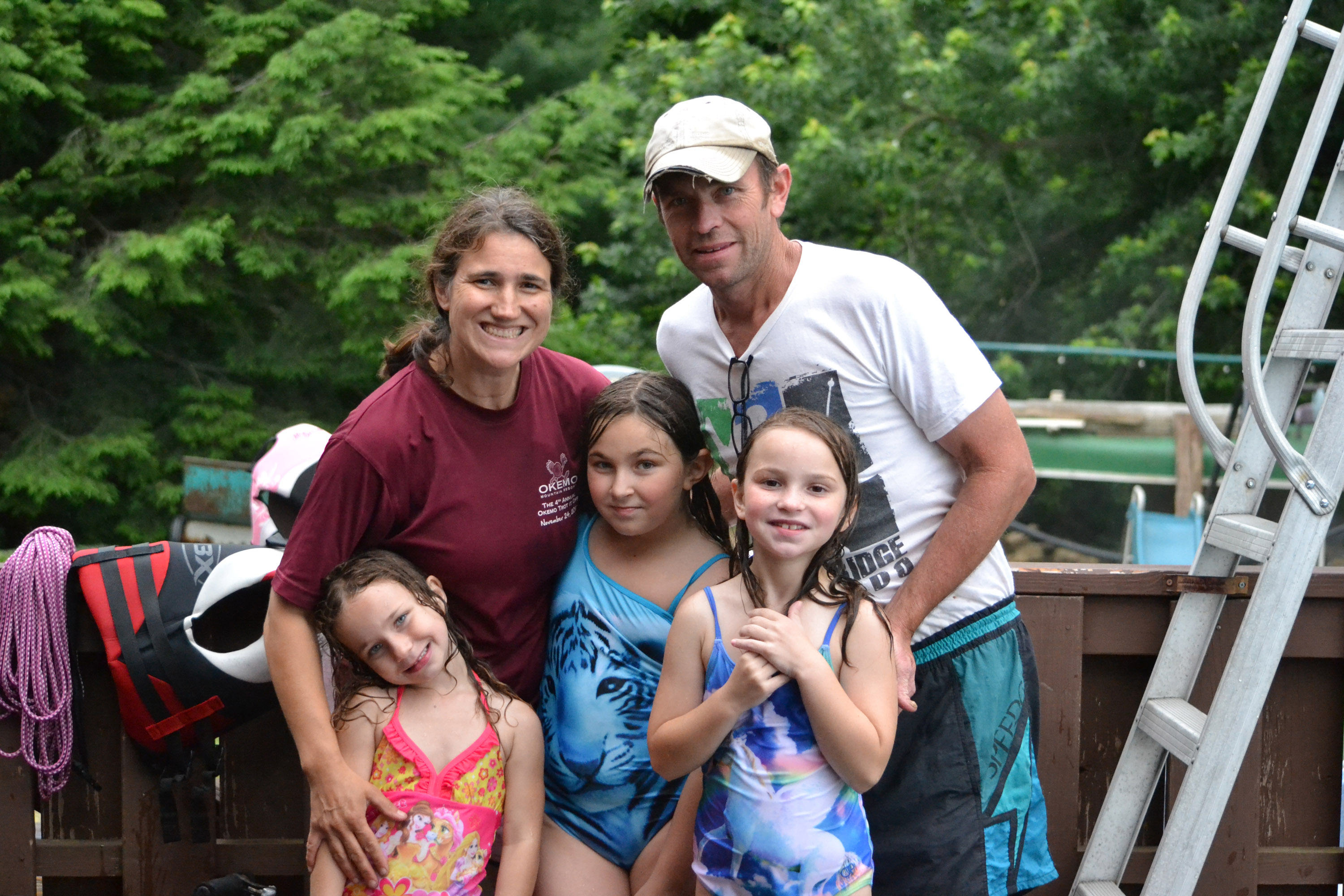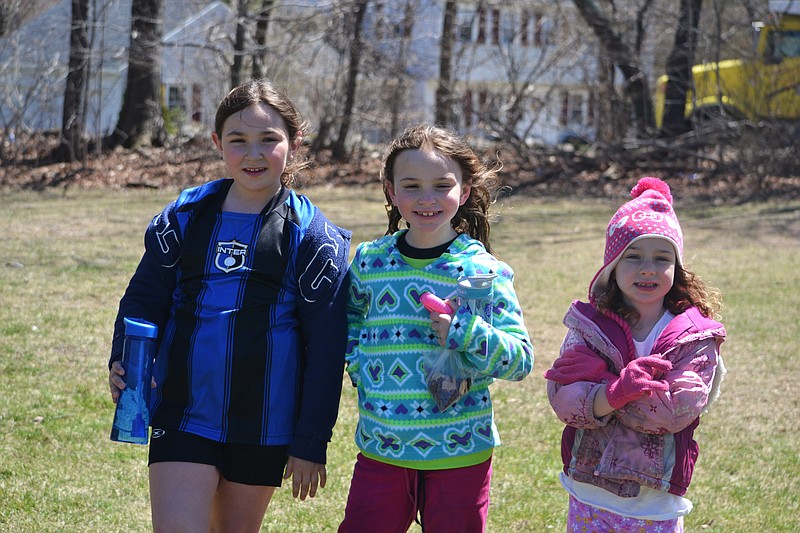 Amy and Scott McKearney with their children, from left, Diane, 4, Kelley, 9, and Meghan, 7, at their home in Thomaston, Conn. "I'm definitely not a helicopter parent but I'm not a free-range parent, either," Amy McKearney says. While she's still on chauffeur duty to distance and busy roads, McKearney has found lots of little ways to foster growing independence in her brood.
Amy and Scott McKearney with their children, from left, Diane, 4, Kelley, 9, and Meghan, 7, at their home in Thomaston, Conn. "I'm definitely not a helicopter parent but I'm not a free-range parent, either," Amy McKearney says. While she's still on chauffeur duty to distance and busy roads, McKearney has found lots of little ways to foster growing independence in her brood.Much is made about two distinct styles of parenting. We've got the hovering helicopters and the risk-taking free-rangers, and back-to-school season threatens to bring out the beast in both.
Parents of newly minted kindergartners cling to school fences, while first-time middle schoolers are encouraged to find their own way there after years of being micromanaged.
In between are the middle-grounders, parents who embrace baby steps to independence. Encouraging, instilling and planning for more freedom and responsibility for kids doesn't have to be an ordeal, some says. And back-to-school season can be the perfect time to figure out the next round.
Take Amy McKearney, a mom of three girls, ages 4, 7 and 9, in Thomaston, Conn. While she's still on chauffeur duty for school and many activities, she has found lots of little ways to foster growing independence in her brood.
"I let my oldest go to the park with my 4-year-old while I watch the 7-year-old play soccer," she offers. "It's about 100 yards away."
And she made full use of learning resource centers situated in some Connecticut schools for kids 5 and under as a way to help build trust in outside-the-family adults in a play-group setting but within a school environment. Parents are required to stick around but take a backseat.
"That way, I was still there but at a distance," McKearney says. "It's a good way to work on things, like whether your child is shy in a group."
Another useful tactic: Rather than hover while grocery shopping, she'll wait for her number to be called at the meat counter and send her oldest to other aisles to pick up items on their list. And at a nearby familiar amusement park, her two oldest are allowed to roam together.
"They've been there at least 50 times. I know they know their way around," McKearney says. "They'll go on rides while I go with my smaller one or stay in a central location."
McKearney's baby steps might put fear into some helicopter parents wary of leaving young kids unsupervised in public places. No worries, says mom Christina Woelffer in Raleigh, North Carolina. She sees opportunities to foster school-worthy skills for her three kids - 3, 5 and 7 - right at home.
"My kids attend a Montessori school, of which a main principle is the child's need for independence and the adult's need to recognize them as a person versus a baby," she says. "So, what we do at home closely mirrors the attitude which is found in the classroom: bring your dishes to the sink, clean up after yourself, order your own food at a restaurant, etc."
Sound simple? It should be, parenting experts says.
"Our job as parents is to put ourselves out of a job," says mom-of-two-teens Julie Lythcott-Haims, a former freshman dean at Stanford University and author of the book "How to Raise an Adult: Break Free of the Overparenting Trap and Prepare Your Kid for Success," out in June from Henry Holt and Co.
"I saw parents coming to campus and not leaving, literally and virtually. They began to be present in the university experience in the late '90s. They came in greater numbers every year and we thought it was silly, then odd and a little annoying because the university didn't have an easy way to accommodate so many third parties who thought they had a role to play," she says.
Yet Lythcott-Haims, in Palo Alto, Calif., found herself falling into the overparenting trap when her own kids, soon to be 14 and 16, were younger.
"I came home one day after gently scolding a set of Stanford parents about, you know, 'You've dropped your student off today. Trust us, trust them, now go home,' and realized I was still cutting my kids' meat - and they were 8 and 10," she says. "That was my big aha moment. I thought, 'Wait a minute, when do you stop cutting their meat?'"
Kim John Payne, a former school and family counselor in Northampton, Mass., is the dad of two daughters, 13 and 16. Hovering for years then abruptly letting go once kids are older - without adequate preparation - is an issue that rears regularly among kids and parents today, he says.
"Rather than think about, 'Am I helicoptering, am I free ranging, am I, am I?' there's a third dimension, and the third dimension is expanding our firm but loving boundaries as kids grow, so that we transition the way we hold them both physically and emotionally," says Payne, who wrote the book "The Soul of Discipline: The Simplicity Parenting Approach to Warm, Firm and Calm Guidance - from Toddlers to Teens," out in June from Ballantine Books.
Guide with a light touch "provided your kids are coping," he added. "If kids have been really closely held for quite a long time and they're not used to it, that's a situation."
For back to school, Payne suggests, ask older kids to outline their own strategies for tackling new challenges and tasks. For younger kids, like new kindergartners, he says, parents often project anxiety without realizing it.
"Before school starts, go walk around the school. Take the dog for a walk there or go play Frisbee on school grounds with your child. Get them familiar and get yourself familiar," he says. "But play. Don't just walk around and be all serious."
Woelffer has some back-to-school strategies of her own.
"For my 7-year-old this year, I'll ask him to be completely responsible for his items each morning. We've been working on this, and he's pretty much there: backpack, sunglasses, lunch and a jacket," she says. "Additionally, I'll remind him less to do his homework and allow him to fail a couple times. That'll be tough for me."
The 5-year-old will receive fewer reminders of what books and supplies she needs.
"I'll encourage her to shower by herself, and she'll be nudged to walk to her neighbor friend's house by herself," Woelffer says.
And her 3-year-old? "She's already trying to do all these things, so I'll have to rein her in!"
